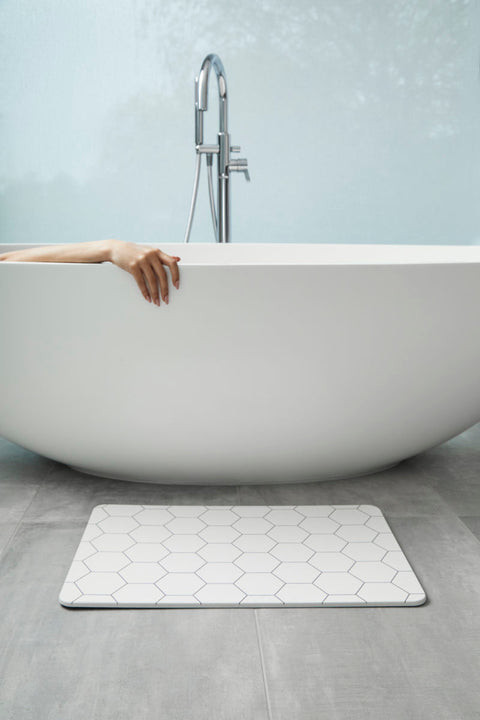
Which Is The Best Bath Mat? Top 9 Materials For Bath Mats Examined
So, you need a bath or shower mat but you want to make sure it’s non-slip and anti-microbial? Or maybe you want to find a particular colour or make sure it’s produced from a sustainable material.
This article introduces the types of material bath mats can be made from and the advantages and disadvantages of each, so you can decide based on what is important to you. It includes a rating for comfort, sustainability, hygiene, durability, absorption, safety, functionality and style. We have identified 9 frequently purchased types of bath mats to compare. See the table below to see which product came out on top.
What types of bath mats are available?
- Natural Earth Stone
- Bamboo
- Cotton
- Cork
- Memory foam
- Polyester/Chenille Microfibre
- Nylon
- Rubber
- Wood
Results
| Material / Rating | Bamboo | Cotton | Cork | Natural Earth Stone | Memory Foam | Polyester / Chenille Microfibre | Nylon | Rubber | Wood |
| Comfort | 5 | 10 | 6 | 6 | 8 | 9 | 7 | 4 | 5 |
| Hygiene | 8 | 2 | 5 | 10 | 7 | 4 | 4 | 3 | 6 |
| Durability | 8 | 5 | 5 | 9 | 6 | 5 | 7 | 3 | 8 |
| Absorption | 3 | 5 | 5 | 9 | 8 | 7 | 6 | 1 | 3 |
| Safety | 5 | 5 | 5 | 9 | 8 | 5 | 6 | 10 | 5 |
| Functionality | 4 | 5 | 4 | 9 | 8 | 5 | 5 | 5 | 4 |
| Style / image | 6 | 8 | 4 | 9 | 6 | 3 | 4 | 1 | 6 |
| Sustainability | 10 | 1 | 8 | 9 | 4 | 2 | 3 | 2 | 8 |
| Overall score | 61% | 51% | 53% | 81% | 69% | 50% | 53% | 36% | 56% |
Natural Earth Stone Bath Mats
A less familiar type of bath mat is made from Natural earth stone or diatomaceous earth stone. They are marketed as non-slip, anti-mildew, anti-bacterial, super-absorbent not requiring machine washing and drying! They are made from an eco-friendly material that can be turned into a powdery form at the end of life and used to help plants grow. Sounds great but are they as good as they sound?
Advantages of natural earth stone bath mats
It’s true that the natural earth stone is surprisingly absorbent, excess water drips enter the porous structure of the mat where they are locked in for a short period before gradually evaporating. The mix of natural earth stone is anti-bacterial and anti-mildew so there is no need to machine wash as with cotton or other synthetic materials. Anyone with a family or busy life will know that cutting down on washing 2-3 times a week can only be a good thing.
Surprising results
The benefits go far beyond saving time, with the current cost of electricity rising to average of 28p per kw/h unit in the UK, a full machine wash and dry now costs as much at £2. As bath and shower mats are heavy, 2 of them will fill up at least half a load. The saving over a year in a household with 2 mats being washed twice a week would be as much as £67 per annum and an energy saving of 242 kw. If you like to track your carbon footprint, that equates to 53kg co2 which is the same as travelling 244 miles in an average petrol car or turning all your lights off for 6 months!
The mats are also very hardwearing and should last a lifetime if well looked after. The material is simply blended rock that can be ground down and used to aid water absorbency of plants if it becomes damaged, so it’s a circular product with low end of life impact.
Hard Bamboo bath mats
Advantages of bamboo bath mats
Bamboo is a fantastically sustainable material because it’s actually a grass, so unlike wood, when you cut it down there is no loss of habitat, it just grows back in the same place, in super quick time and needs no fertilizer or extra water. It’s important to check the bamboo is from a sustainable FSC approved location to ensure the bamboo hasn’t been planted at the expense of other biodiversity loss.
Bamboo is often touted as naturally anti-microbial and anti-mildew so there is no need to constantly machine wash, saving money, time and reducing environmental impact. This is only partially true, if Bamboo is left wet it can be prone to growing mould on it's surfaces, just the mould is likely to be restricted to the outer rather than core.
With hard bamboo bath mats, all you have to do is make sure they aren't left overly damp, wipe is down with a cloth and warm water or anti-bacterial spray. If you are thinking of a soft bamboo shower mat than these would require machine washing according to the guidelines on the product.
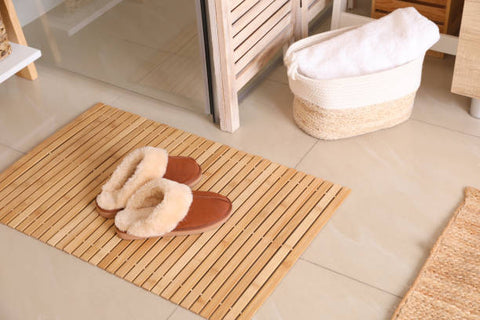
Disadvantages of bamboo bath mats
The water will absorb a little into the bamboo but much of the water will drip through the slats, off the mat or pool on the surface, so it doesn’t entirely solve the problem of water on the floors and potential damage to the floor. Sometimes you can get too caught up in buying a product because it is eco-friendly, but don’t forget, if it doesn’t serve the purpose it was purchased for, the best thing for the environment is not to purchase a product at all. All products have a carbon footprint! Again if you are referring to
With hard Bamboo bath mats you are limited to one colour, so it won’t work with the décor of every bathroom. With soft bamboo mats there is plenty of choice.
Price range for Bamboo bath mats
£18 to £100
Rating (icons)
Comfort – 5/10
Hygiene – 8/10
Durability – 8/10
Absorption – 3/10
Safety – 5/10
Functionality 4/10
Style/image 6/10
Sustainability 10/10
Average score 61%
Cotton bath mats
The traditional bath mat is either cotton or a synthetic version of, but is it the best material to use?
Advantages of cotton bath mats
Cotton is a soft and absorbent material that dries quickly in most environments. It has a reputation for being easy to clean, which would appear to make it an idea choice for bathroom or shower mats!
Egyptian cotton is popular for those seeking extra absorption and durability compared to standard cottons but is a more expensive option.
Cotton is soft and comfortable to the touch so provides a nice user experience, it is also available in a wide variety of colours and thicknesses.
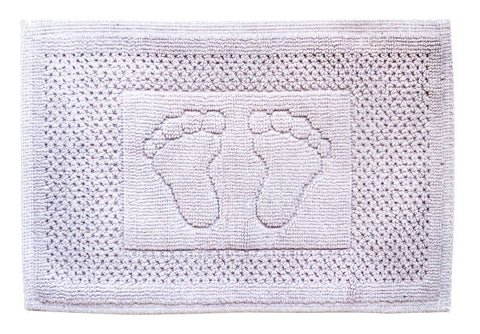
Disadvantages of cotton bath mats
The drawback of cotton bath mats is that they should not be washed at temperatures above 40 degrees C to avoid shrinkage and colour run, this temperature is not enough to finish off residual bacteria, therefore cotton is not the most hygienic choice without anti-microbial additives. According to the NHS shared items like towels and bath mats should be wased at the highest possible recommended temperature for the material.
From an environmental perspective, most cotton is not sustainably sourced and has a significant environmental impact. A report by Puma found that the life cycle impact of 1kg of cotton produces 7.8kg/co2. There are serious concerns about the impact of soil erosion and biodiversity impact caused by cotton production. Organic cotton helps reduce the overall impact
Although cotton is recyclable, the likelihood of it being recycled is extremely low. The cotton is likely to be woven onto a backing material that may or may not be recyclable material but even if it is, hybrid products are never recycled at the end of life as the materials are too difficult to separate. If its not woven into a non-slip backing it could well present a hazard, especially for the elderly.
Price range for cotton bath mats
Cheap cotton mix bath towels start from as little as £3.95, Organic cotton mats are around £25 and Egyptian cotton will set you back at least £35.
Rating (icons)
Comfort – 10/10
Hygiene – 2/10
Durability – 5/10
Absorption – 5/10
Safety – 5/10
Functionality 5/10
Style/image 8/10
Sustainability 1/10
Score 51%
Cork bath mats
Cork offers interesting sustainable, alternative to a traditional bath or shower mat but is it practical?
Advantages of cork bath mats
Cork is another popular bath mat material. Correctly sourced cork is another fantastically sustainable material as it comes from the bark of a tree and doesn’t require the tree to be cut down. The cork oak tree mainly grows in southern Europe, and harvesting is done by highly skilled specialists. It’s not quite as quick to grow as bamboo, as the tree must grow for 25 years before it can first be harvested, then every 7 years thereafter. Cork trees have a lifespan of up to 300 years.
Unlike soft bath mats, cork can be wiped down and aired rather than machine washed, saving the cost and environmental impact associated with machine washing and drying. Cork mats are definitely non-slip as the material is naturally ‘grippy’ to the floor. They are also marketed as absorbent and quick drying, simply stand the mat on its edge after use.
Real Cork is naturally anti-fungal which is great for a wet bath mat.
Cork has a nice spongy and warm feel.
Disadvantages of cork bath mats
The absorbency of cork is a matter of debate. Cork is hydrophobic which means it is difficult to wet, which is why it is used in wine bottles. A small amount of cork contains millions of tiny cells of suberin gas that help insulate and protect cork from physical or biological intrusions such as water and mould spores. In theory, Cork isn’t necessarily going to be that absorbent
Cork’s near impermeability means that much of the water could run off the bath mat on to the floor causing safety issues and negating much of the point of having a bath mat
Another issue with cork is making sure your cork bath mat is really cork. Some cork bath mats are an engineered product that have a high-density fibreboard core that is made of recycled wood fibres. This will NOT give you a true mould and mildew resistant bath mat.
Like Bamboo, Cork offers a very limited range of finishes. Most mats are manufactured from granulated cork to a flat finish however some have a contoured effect. To read a more indepth assessment of cork bath and shower mats read our blog
Price range for cork bath mats
£18 to £35 (for products marketed as authentic and traceable cork)
Rating (icons)
Comfort – 6/10
Hygiene – 5/10
Durability – 5/10
Absorption – 5/10
Safety – 5/10
Functionality 4/10
Style/image – 4/10
Sustainability – 8/10
Score 53%
Stylish
The natural earth stone mats look really high quality and enhance the design of a bathroom with a premium feel.
Disadvantages of natural earth stone mats
People who like getting onto a soft cotton mat might not be so happy to step onto a hard mat. Although you may assume a natural stone mat would be cold, this isn’t the case. The porous nature of the mat actually retains heat very well and they are not remotely cold to the touch.
Price range for Natural stone bath mats
Typical prices are £35-55
Rating (icons)
Comfort – 6/10
Hygiene – 10/10
Durability – 9/10
Absorption – 9/10
Safety – 9/10
Functionality 9/10
Style/image – 9/10
Sustainability – 9/10
Score 87.5%
Microfibre bath mats
Advantages of Micro-fibre bath mats
Mould and mildew resistant - “micro” fibre is a yarn that is finer than natural fibers (silk and hair) This fineness of the microfibres allows them to be woven tightly together, creating a high number of micro-pores between each fibre which give microfibre bath mats an absorbency seven times higher than cotton bath mats.
Microfibre bath mats are simple to dry. They are ideal in colder climates as even at room temperature they will dry a lot quicker than cotton towels, keeping them relatively fresh.
Disadvantages of Micro-fibre bath mats
A lot of micro-fibre in the marketplace is low quality 100% polyester that feels cheap and doesn’t recycle easily, often ending up in landfill. They also don’t look high quality.
Micro-fibre mats will need some sort of rubber backing to be non-slip which will mean that excess water will pool at the bottom of the mat, so although the microfibre is absorbent they will saturate like cotton and be prone to mould and mildew growth.
Micro-fibres also need washing at a low temperature, typically 30 degrees C. When you consider how bacteria-laden bath mats can be, much of the germs and bacteria will not be destroyed.
Price range for Microfibre bath mats
£6.99- £30
Rating (icons)
Comfort – 9/10
Hygiene – 4/10
Durability – 5/10
Absorption – 7/10
Safety – 5/10
Functionality 5/10
Style/image 3/10
Sustainability 2/10
Score 50%
Finishes - many colours possible. The micro fibres range in size and density to suit your taste.
Memory foam bathmats
The technical name for Memory foam is “viscoelastic” polyurethane foam. Did you know that it was originally developed by NASA to help cope with the impact of G-Force!
Advantages of memory foam bath mats
Memory foam is usually associated with beds but memory foam bath mats are becoming increasingly popular as they are super absorbent, are non-slip and durable enough to tolerate machine washing. Memory foam bath mats also offer the comfort of cotton bath mat. They are non-slip because the feet sink into material.
Memory foam is fast drying so bacteria and mould have little opportunity to establish themselves. Some examples have been treated with an antimicrobial technology to keep your bath mat fresher for longer.
Surprisingly, memory foam or polyurethane is recyclable and can be found found in multiple products with diverse uses.
Disadvantages of memory foam bath mats
Memory foam bath mats have to be washed at low temperatures to avoid shrinkage and erosion of the material, therefore may not kill all bacteria.
Memory foam will also be slippy if placed onto a wet surface, however most are backed with a non-slip material. This additional material makes washing and recycling harder though. As we mentioned before, rubber backed mats can cause damage to washing machine.
Recycling is often an issue at the end of life as it depends on identification and channelling correctly, the sad reality is that this simply doesn’t often and the material will end up in landfill or being incinerated. Fossil fuels and energy intensive manufacturing are necessary to produce memory foam.
Price range for Memory foam bath mats
£12 - £142
Rating (icons)
Comfort – 8/10
Hygiene – 7/10
Durability – 6/10
Absorption – 8/10
Safety – 8/10
Functionality 8/10
Style/image 6/10
Sustainability 4/10
Average score 69%
Nylon bath mats
Nylon was first commercialised in 1938 and used for toothbrush bristles, being popularised in 1939 when it became popularised by its use in ladies tights - 'Nylons'. Today it is used is all kinds of products including bath and shower mats.
Advantages of Nylon bath mats
Nylon bath and shower mats are popular because they are inexpensive, durable and naturally stain resistant. Nylon bath mats dry quicker than cotton. Generally, these types of mats are backed with non-slip material.
Disadvantages of Nylon bath mats
Nylon is not as soft as cotton and its absorbency is slightly less. It is also really bad for the environment. According to the guardian it accounts for 10% of the material found in the world’s oceans. It is a very energy intensive, carbon emitting material to produce and rarely gets recycled. We need to stop our dependency on such materials and find lower impact solutions.
Price range for Nylon bath mats
£10 - £20
Finishes
Nylon is easy to colour and add basic patterns to so there are lots of options available.
Rating (icons)
Comfort – 7/10
Hygiene – 4/10
Durability – 7/10
Absorption – 6/10
Safety – 6/10
Functionality 5/10
Style/image 4/10
Sustainability 1/10
Score 53%
Rubber bath mats
Advantages of rubber bath mats
Rubber is an excellent non-slip, grippy material. Think car tyres and the soles of shoes. You often find rubber mats in nursing homes and hospitals for reasons of safety.
Disadvantages of rubber bath mats
They look pretty cheap and nasty, being functional rather than attractive. They don’t absorb water, which you would think would be one of the primary reasons for a bath mat. They also require vigorous, regular cleaning as they are very prone to growing mold underneath which can be very hard to remove. The suction pads tend to be hot spots for bacteria growth.
In nursing homes and hospitals there are regular cleaning routines but in an elderly person’s house, maintaining this same level of hygiene will take work.
Rubber bath mats will fall apart if regularly machine washed.
Price range for Rubber bath mats
£7 to £60
Rating (icons)
Comfort – 4/10
Hygiene – 3/10
Durability – 3/10
Absorption – 1/10
Safety – 10/10
Functionality 5/10
Style/image 1/10
Sustainability 2/10
Score 56%
Wooden bath mats
There is quite a range of wooden bath mats including Cedar, teak or Bamboo (as we have already mentioned).
Advantages of wooden bath mats
Protected wood is a good alternative material for keeping bacteria away and keeping out moisture that would be trapped by a cloth bath mat. Acacia and teak wood, thanks to its natural resistance against moist and mildew, is especially suitable for bathrooms. Other types of wood bath mats can be treated with an anti-microbial coating, however this my break down overtime. Wood is super-easy to wipe clean and because wooden bath mats are durable, they will do the job for years without needing to be replaced, cloth mats, on the other hand can degrade quickly from frequent washing!
Wood is a largely sustainable material when used in solid reusable products like bath mats that will store the carbon they have captured when they were a tree. Wood is a terrible product for single-use products where they end up in landfill and decompose releasing the carbon capture. It is worth checking whether the wood used come from FSC certified sources. Cedar bath mats give off a wonderful aroma to enhance the bathroom experience.
Disadvantages of wood bath mats
Wood bath mats are naturally water resistant so puddles will form. On one hand, manufacturers will say this is a good thing as they won’t saturate and become a breeding ground for bacteria and mould, however it also means the problem is simply being shifted and water is dripping through the slats on to the floor. Anyone who has wood worktops in their kitchen will know it stains easily if not dried when wiped, so it’s advisable to dry it after each use. The ideal bath mat will absorb water not repel and then dry very quickly, be pleasant to stand on, eco-friendly and easy to maintain. Wood fulfils part of this criteria but not all. Wood is also limited in the number of finishes available, which may be fine if you are going for a minimalist themed bathroom.
Price range for Wooden bath mats
£19.99 to £100
Rating (icons)
Comfort – 5/10
Hygiene – 6/10
Durability – 8/10
Absorption – 3/10
Safety – 5/10
Functionality 4/10
Style/image 6/10
Sustainability 8/10
Score 56%
For more detail please check out our more in depth articles on
To learn more about innovative Natural earth stone mats please visit the Natural Steps homepage.
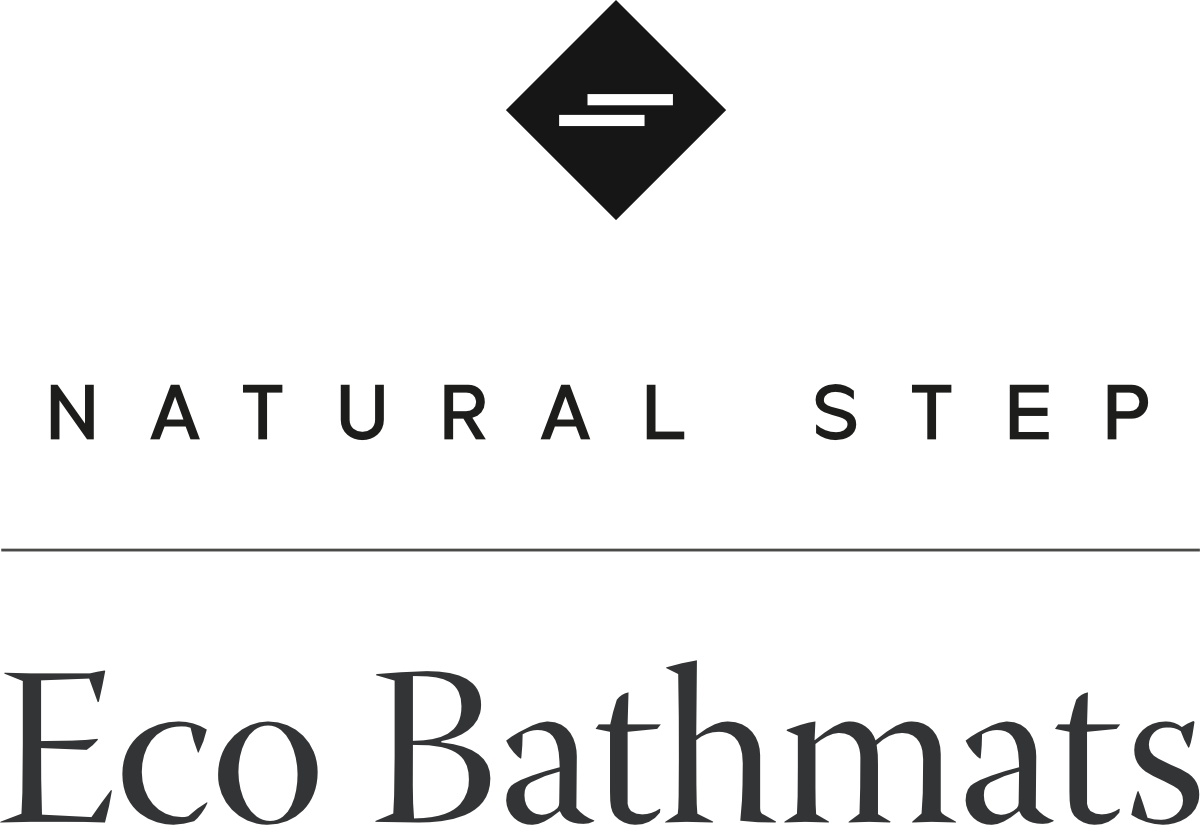
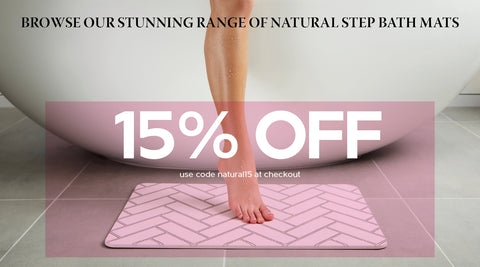
Comments (0)
There are no comments for this article. Be the first one to leave a message!